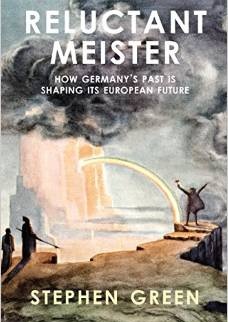Europe’s Path and the Great Global Convergence?
A continent in decline.
March 14, 2015

A generation after the fall of the Berlin Wall, the reunified Federal Republic of Germany is becoming the reluctant leader of a new Europe. But it does so at a time when there is an existential question about the very identity and the whole future of Europe.
This question is one for all Europeans, but it must weigh most heavily upon that inevitable and reluctant leader.
Europe is now in long–term relative decline, both politically and economically. It is no longer the energetic, ambitious and aggressive continent it was when the Portuguese, the Spanish, the Dutch, the French and the British set out over the oceans to plunder, trade and colonize.
Europe also is no longer the continent whose technical brilliance the Chinese emperor Qianlong so notoriously spurned when Lord McCartney sought to open commercial dealings with China in 1793.
It is no longer the continent where an aggressive Germany sought to settle and Germanize vast tracts of Slav land to the east and unleashed a campaign of unbelievable brutality in pursuit of that goal.
And it is no longer the frontline of a Cold War between two superpowers with the capacity to destroy themselves and everyone else many times over.
The end of European military power
Europe has retreated from being the self-defined center of the world to being what it had been before the 15th century – a corner of the Eurasian land mass. It remains fertile, populous and wealthy, but it is profoundly uncertain about its identity and its future.
France and Britain – alone of all those former great powers – still lay claim to the ability to project military might over long distances, and they still preserve the legacy of their former global roles in the form of permanent seats with veto power in the Security Council of the United Nations.
But neither any longer has the strength or the mass to sustain a significant military campaign alone.
Yet at no point in the decades after the war has Europe been able to develop any credible collective ability to project independent power. Looking forward, it is clear that it does not even want to do so.
The eastward shift
Europe is also in relative decline as an economic force, not just as a locus of political power. Having led the world during the first industrial revolution of the 19th century, it then saw the center of gravity shift away across the Atlantic at the beginning of the 20th century and especially after the First World War.
After the massive destruction of the Second World War, the United States was firmly ensconced as the overwhelmingly dominant economic power.
At least this meant that (Western) Europe could position itself as part of a transatlantic relationship with shared interests, a common commitment to democracy and – up to a point – a common economic approach.
As a result, Western Europe’s economy grew rapidly for a while as it recovered from devastation, bringing the people of Europe a degree of widespread prosperity they had never known before.
But this proved to be only an interlude. For since the epochal year of 1989, the rise of Asia has driven a new and historic shift of the center of global economic gravity, this time to the east.
The reemergence of China as a great power, and the modernization and urbanization of so many countries in Asia – and increasingly in other continents which had in a previous era been dominated by imperial powers from Europe – have contrasted sharply with a sustained sluggishness in the old economies of Western Europe.
The acceleration of crisis
Even if all had gone well for the Europeans, there would have been a decline in their share of the world’s income. And they would have had to become used to dealing with new actors on the world stage.
But in fact the European performance has been weakened. This is partly due to the extreme stress within the Eurozone, and partly to the global financial and economic crisis which was unleashed in 2008. So the crisis has, if anything, accelerated the historic shift towards the east.
Europe is left struggling to find a secure foothold in a global marketplace which is becoming more and more interwoven – and where its ever more sophisticated eastern competitors are conscious that their time has come.
China and the United States may be wary of each other. However, both recognize what is happening and know that Europe is losing its historical significance.
A return to the long-term status quo
For Europe, loss of market share was of course inevitable. That has been the fate of all the early developers, including both the United States and Japan.
It is the result of a historic reversion to the norm: Before the 19th century a country’s share of global output was roughly in proportion to its share of world population. Then as now, China had the largest population in the world – and, as late as about 1820, China had the world’s largest economy.
That changed with the onset of the industrial revolution. It enabled, for the first time in human history, some economies to produce consistently above subsistence level, thus creating a gap between the two ratios.
It was the Europeans first, then the Americans, and later the Japanese, who thus achieved enormous increases in world market share. At their peak, these developed countries represented less than a fifth of the world’s population, but created around three quarters of world GDP.
The gap is now closing again, as not only China but also country after country in Asia (and elsewhere in the emerging world) start to catch up with the standards of living which Europeans have come to take for granted.
By 2020, on present trends, China may well be the world’s largest economy again. This great convergence, with all that it implies, is the most important fact about the first half of the 21st century.
This is the great challenge to Europe. Its response to this new reality – to the new economic and cultural competition – has been underwhelming.
Editor’s note: The above text is adapted from Reluctant Meister: How Germany’s Past is Shaping Its European Future by Stephen Green, Haus Publishing (December 15, 2014)
Takeaways
Europe has retreated from self-defined center of the world to being the corner of a great landmass.
For Europe, loss of market share was inevitable and a reversion to the historical norm: China No. 1.
Europe’s response to new economic and cultural competition has been underwhelming.

